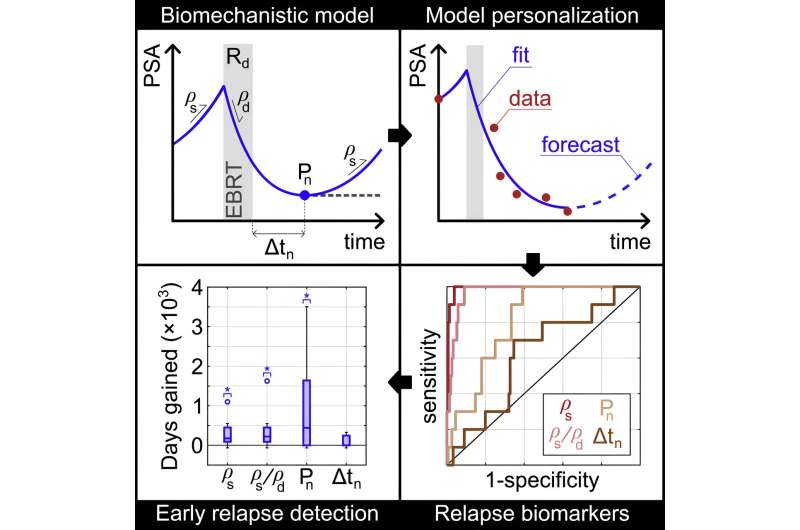This article has been reviewed according to Science X's editorial process and policies. Editors have highlighted the following attributes while ensuring the content's credibility:
fact-checked
peer-reviewed publication
trusted source
proofread
Predicting prostate cancer recurrence 15 months sooner

A Purdue University mechanical engineer and his international collaborators have developed a patent-pending method and algorithm to predict the recurrence of prostate cancer in patients treated by radiation therapy.
Hector Gomez, a professor in Purdue University's School of Mechanical Engineering, said data indicates the model-based predictors can identify relapsing patients a median of 14.8 months earlier than the current clinical practice.
Gomez said radiation is an effective treatment for patients of all ages to treat tumors ranging in risk from low to very high. According to Johns Hopkins Medicine, between 20% to 30% of patients will experience a recurrence after the five-year period, post-therapy.
"The detection of prostate cancer recurrence after radiation relies on the measurement of a sustained rise of the serum levels of a substance called prostate-specific antigen, or PSA," Gomez said. "However, the recurrence may take years to occur, which delays the delivery of a secondary treatment to patients with recurring tumors."
Gomez and his collaborators at the University of Pavia in Italy and the University of Castilla—La Mancha in Spain have developed novel, patient-specific forecasts of PSA dynamics to predict cancer recurrence. Their research has been published online in iScience, an open access journal.
The algorithm is based on a patient-specific mechanistic model, informed by the periodic PSA measurements for an individual patient. These measurements are part of the standard monitoring for prostate cancer patients who have undergone radiation.
"The PSA data is used in conjunction with the model to obtain patient-specific parameters that determine the PSA dynamics and serve as classifiers for recurrence," Gomez said. "In addition to recurrence identification, our model can be used for designing personalized PSA monitoring strategies. It can tell physicians the right time to investigate tumor recurrences and maximize the window of curability."
Gomez and his collaborators tested the method using retrospective data from a cohort of 166 patients.
"For each of these patients, we compared the time when our model first identified the recurrence with the standard medical practice," Gomez said. "We found that our method predicted recurrence a median of 14.8 months earlier."
Gomez said the model will be further developed to expand the population of patients who can benefit from it.
"Our current model can be used only for patients who do not receive any treatment additional to radiation," Gomez said. "Some patients receive radiation and hormone therapy simultaneously and cannot benefit from our method right now. We plan to extend the method to make it applicable also to patients who receive radiation and hormone therapy simultaneously."
More information: Guillermo Lorenzo et al, Patient-specific forecasting of postradiotherapy prostate-specific antigen kinetics enables early prediction of biochemical relapse, iScience (2022). DOI: 10.1016/j.isci.2022.105430



















